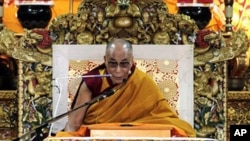Tibet’s exiled parliament, based in northern India, has begun a crucial session to discuss the Dalai Lama’s request to step down as political head of the exiled Tibetan movement.
At the start of the session of the exiled parliament in the northern Indian town, Dharamsala, the speaker read out a formal request from the Dalai Lama to give up his role as political leader.
In a lengthy written message, the 75-year-old Tibetan leader says if "we have to remain in exile for several more decades, a time will come when I will no longer be able to provide leadership", and stressed the importance of establishing a sound system of governance. He says he wants the Tibetan administration to become self reliant.
The Dalai Lama, who wants autonomy for Tibet within China, has spearheaded the cause of exiled Tibetans, since he fled his homeland more than half a century ago.
The spokesman for the Tibetan government in exile, Thubten Samphel, says members of parliament will take a final view on the Dalai Lama’s request, following a debate.
"The speaker of Tibetan parliament has given time for each individual member of the parliament to thoroughly go through His Holiness’s written statement, to think about his message,” Samphel said. “After this, when parliament reconvenes tomorrow (Tuesday), I think they will have a thorough discussion on His Holiness’s request."
After the Dalai Lama announced his decision to relinquish his political role last week, parliament asked him to reconsider his request.
But the Dalai Lama, who made the crucial announcement on the eve of elections for a new prime minister for the exiled administration, appears determined to transfer political authority to a new generation of Tibetan leaders.
That election is now being viewed more closely than ever in the past, because, if the Dalai Lama’s request is accepted, the new prime minister will make political decisions relating to the Tibetan cause.
The three candidates are Lobsang Sangay, a visiting research scholar at Harvard Law School; Tenzin Tethong, a former representative of the Dalai Lama in New York and Washington; and, Tasha Wangdi, who has been in charge of several government-in-exile departments. All three candidates in the race have urged the Dalai Lama to reconsider stepping down.
The Dalai Lama, who put the Tibetan cause on the world map, has said that he will continue to work for Tibetans.
Tibet’s Exiled Parliament Discusses Dalai Lama’s Request to Step Down




